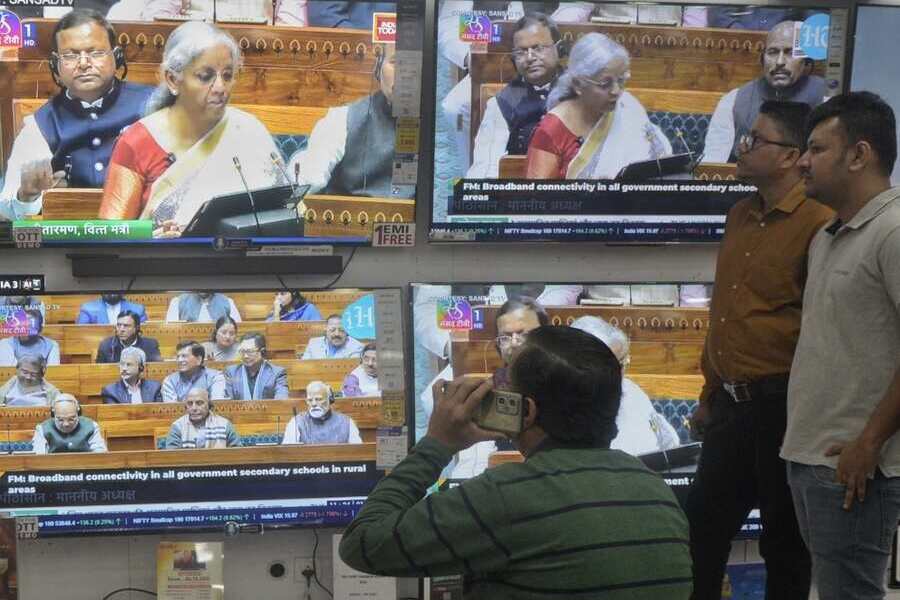 Sunday, 02 February 2025
Sunday, 02 February 2025
 Sunday, 02 February 2025
Sunday, 02 February 2025
Israel launched airstrikes against more than 1,000 Hezbollah targets on September 23, killing more than 500 people, including more than 90 women and children and sending tens of thousands fleeing for safety in Lebanon's deadliest day in decades, according to authorities.
Thousands of Lebanese fled the south, and the main highway out of the southern port city of Sidon was jammed with cars heading toward Beirut in the biggest exodus since 2006.
The death toll far surpassed that of Beirut's devastating port explosion in 2020, when hundreds of tons of ammonium nitrate stored in a warehouse detonated, killing at least 218 people and wounding more than 6,000.
In a recorded message, Israeli Prime Minister Benjamin Netanyahu urged Lebanese civilians to heed Israeli calls to evacuate, saying “take this warning seriously.”
“Please get out of harm's way now,” Netanyahu said. “Once our operation is finished, you can come back safely to your homes.”
Israel's military spokesman, Rear Admiral Daniel Hagari, said the army will do “whatever is necessary” to push Hezbollah from Lebanon's border with Israel.
Here’s a quick look at how countries and international groupings have reacted to the conflict.
Biden: Working to de-escalate tensions
White House officials watched with concern over the weekend as Israeli warplanes struck targets in Lebanon while Hezbollah fired rockets and drones into northern Israel. The president and his aides were closely monitoring the situation from Wilmington.
Joe Biden's national security adviser, Jake Sullivan said, “For us, the most useful exercise is to try to drive both parties to a place where we get an agreed and durable outcome that can end the cycle and keep us from ending up in the larger war.”
At the start of the meeting with the leader of the United Arab Emirates, Biden said he had been briefed on the latest developments between Israel and Lebanon, where Lebanese officials said Israeli airstrikes killed at least 492 people on Monday.
"My team is in constant contact with their counterparts, and we're working to de-escalate in a way that allows people to return to their home safely," he said.
The United States does not support the escalation between Israel and Hezbollah across the border, a senior State Department official said, adding that Washington was going to discuss "concrete ideas" with allies and partners to prevent the war from broadening.
Iran: ‘Israel seeks to create all out-conflict’
Israel wants to drag the Middle East into a full-blown war by provoking Iran to join the nearly year-old conflict between Israel and Tehran-backed Hezbollah in Lebanon, Iran's president said on Monday, warning of its "irreversible" consequences.
Masoud Pezeshkian, speaking to a group of journalists after his arrival in New York to attend the United Nations General Assembly, said: "We do not wish to be the cause of instability in the Middle East as its consequences would be irreversible"
"We want to live in peace, we don't want war," he added. "It is Israel that seeks to create this all-out conflict."
Pezeshkian was asked if Iran had advance knowledge of the Oct. 7 Hamas attacks on Israel that killed about 1,200 people, most of them civilians.
“The Americans know, and Israel is very well aware that Iran was not aware,” he replied.
Pezeshkian also accused Israel of committing “genocide” in Gaza by attacking schools, hospitals and homes. He defended Iran's support for the Palestinians and Lebanon's Hezbollah militants, saying his country “will not stand by to oppression and injustice.”
Britain calls for ‘immediate ceasefire’
Britain’s foreign minister David Lammy said on Monday that he was "deeply alarmed" by rockets and air strikes in Lebanon and Israel and resulting civilian casualties.
"I repeat my call for an immediate ceasefire on both sides, which I will emphasise when I meet G7 ministers tonight," Lammy said in a post on social media platform X.
NATO warns Israel to de-escalate before it's too late
NATO members have condemned Israel’s military actions in Lebanon and Gaza.
The Spanish government on September 23 expressed "deep dismay and condemnation" over Israeli attacks on southern and eastern Lebanon, underlining that a cease-fire in Gaza is necessary to reduce regional tension, as reported by Reuters.
In a statement, the government condemned Israel’s recent bombardments in response to Hezbollah's attacks on Israel over the weekend, saying "the spiral of violence must stop."
"War must be avoided at all costs. All parties must respect civilian lives and the basic principles of international humanitarian law," said the statement.
G7: ‘No country stands to gain from a further escalation’
The foreign ministers of the Group of Seven (G7) major democracies on September 23 warned that actions and counter-actions in the Middle East risked dragging the region into a broader conflict that no country would gain from.
"Actions and counter-reactions risk magnifying this dangerous spiral of violence and dragging the entire Middle East into a broader regional conflict with unimaginable consequences," the G7 said in a statement after meeting on the sidelines of the United Nations General Assembly.
"They called for a stop to the current destructive cycle, while emphasising that no country stands to gain from a further escalation in the Middle East."
EU calls it ‘almost a full-fledged war’
The escalation between Israel and Lebanon's Hezbollah is almost a full-fledged war, the European Union's foreign policy chief said on September 23.
"This situation is extremely dangerous and worrying. I can say that we are almost in a full-fledged war," Josep Borrell told reporters.
"If this is not a war situation, I don't know what you would call it," he said, citing the increasing number of civilian casualties and the intensity of military strikes.
Borrell said efforts to reduce tensions were ongoing, but Europe's worst fears about a spillover were becoming a reality. He said civilians were paying a high price and all diplomatic efforts were needed to prevent a full-blown war.
"Here in New York is the moment to do that. Everybody has to put all their capacity to stop this path to war," he said.
India shows deep concern for Middle east
Prime Minister Narendra Modi met Palestinian President Mahmoud Abbas in New York on 22nd September and expressed deep concern at the humanitarian situation in Gaza, reaffirming India's support for the early restoration of peace and stability in the region.
"Met President Mahmoud Abbas in New York. Reiterated India’s support for early restoration of peace and stability in the region. Exchanged views of further strengthening long-standing friendship with the people of Palestine," Modi said in a post on X.
"PM @narendramodi met H.E. Mahmoud Abbas, President of Palestine, on the sidelines of UNGA today," the MEA said in an X post.
"The PM expressed deep concern at the humanitarian situation in Gaza and reaffirmed India’s continued support to the people of Palestine," it said.
France wants emergency Security Council meet
France’s foreign minister Jean-Noel Barrot told the UN General Assembly on September 23 that it has “requested that an emergency meeting of the Security Council be held in Lebanon this week”.
Barrot said he was “thinking of the men and women in uniform in Lebanon and the French contingent there”, following a wave of deadly attacks by Israel that have killed at least 492 people.
Greece: ‘There is no effective pressure upon Israel’
Israel is not facing sufficient pressure to end the war in Gaza and the escalation in Lebanon is a minefield that the international community may not be able to deal with, Greece's foreign minister said on Monday.
"It seems that there is no effective pressure upon Israel. We are friends of Israel, and we're strategic partners of Israel, and we're trying to be as open and sincere with them," George Gerapetritis told Reuters in an interview on the sidelines of the United Nations General Assembly.
Gerapetritis said it was crucial that Arabs and Europeans pursue joint rather than disparate initiatives that could weigh on Israel but that the escalation at the Israel-Lebanon border of the last few days showed a collective international failure.
Turkey: 'Conflict could drag entire region into chaos'
Turkey warned Israel’s offensive on Lebanon could “drag the entire region into chaos”, Reuters reported.
In a statement late on Monday, the Turkish Foreign Ministry said countries that "unconditionally support Israel "were helping Israeli Prime Minister Benjamin Netanyahu "shed blood for his political interests."







